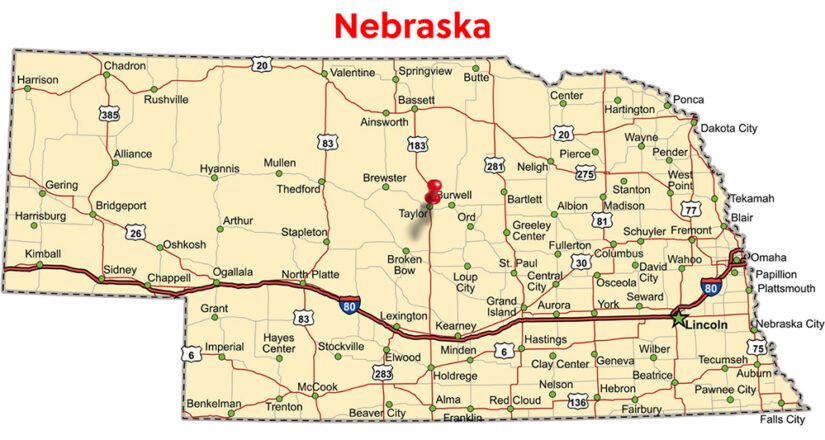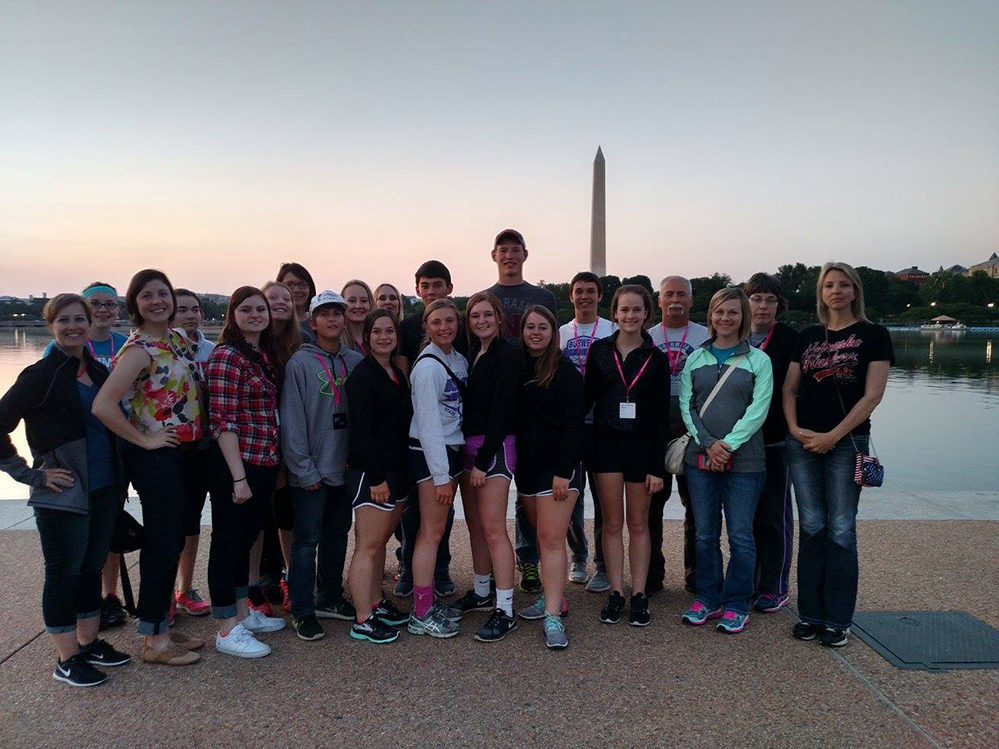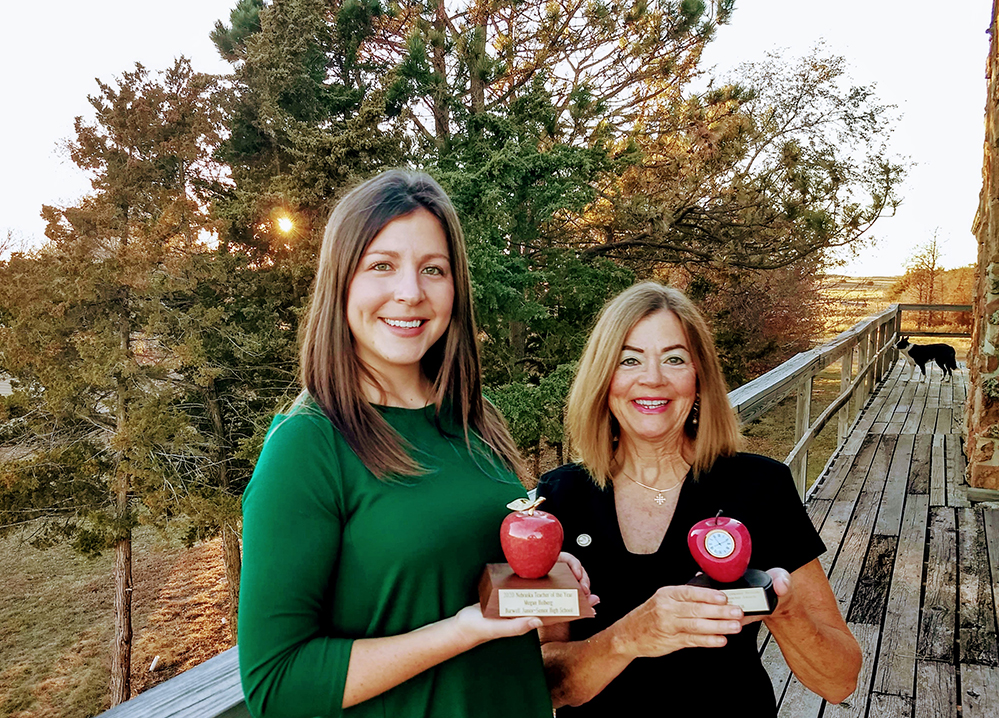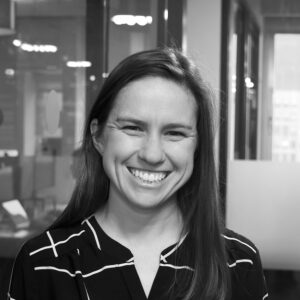A Rural Teacher Challenges Students and Her Community to Wrestle With the World
In the Sandhills of Nebraska, acclaimed educator Megan Helberg is building a ‘woven community of travelers’ through Zooms, trips and life lessons
By Laura Fay | June 15, 2022This is one article in a series produced in partnership with the Aspen Institute’s Weave: The Social Fabric Project, spotlighting educators, mentors and local leaders who see community as the key to student success, especially during the turbulence of the pandemic. See all our profiles.
Teacher Megan Helberg has traveled the world, only to find that all roads keep leading back to where her journey began.
She’s studied in Rwanda with a focus on the 1994 genocide. She taught card games to children in the Amazonian rainforest when the plane carrying her to visit Ecuador’s Sapara tribe was forced by a storm to land in a remote village where no one spoke English. She sat down with the First Lady at the White House. Her walks through Europe’s concentration camps led her to reach out to the Anne Frank House in the Netherlands, to collaborate on a Holocaust curriculum for American high school students.
But for all the sights and memories from these global travels, Nebraska’s 2020 Teacher of the Year says she’s never quite found anything to match the sense of community and belonging she feels alongside her 189 neighbors in her small hometown of Taylor.
She can even point to the year when she first realized what a unique and special place it is: 1994.
When Helberg was just 10 years old, her father learned he would need a heart transplant. The nearest medical center equipped for such a procedure was in Omaha, more than 200 miles east. She and her immediate family made the trip, which lasted 52 days
Nebraska’s state slogan has long been “the good life,” and that’s exactly what the family encountered in those difficult days — a community of people doing good to help their neighbors, because they could.
Today the 37-year-old still vividly recalls how her Taylor “family” immediately and seamlessly jumped into action, mobilizing to help her and her parents through those tumultuous months. Friends checked on the house, while neighbors helped work the family ranch. Helberg’s teachers took it upon themselves to coordinate directly with the intensive care nurses in Omaha, faxing homework and completed assignments back and forth across the state, determined to preserve Helberg’s connection to school and keep her academically on track.
Helberg remembers her family getting into the car that first night to drive east, only to discover they were out of gas and the station was closed for the evening. The owner got out of bed and turned on the pumps just for them.
“You know that old saying, ‘It takes a village’? I really saw that here,” Helberg says of Taylor. “Where I grew up, people were willing to help … Little things like that have stuck with me throughout my entire life. It makes me realize that I want to be that type of person for other people in a community.”
So perhaps it’s not surprising that although she’s seen the world, she felt compelled to return to the community that made her feel valued as a child, determined to help the next generation. Helberg moved back to Taylor in 2010 to teach in nearby Burwell, Nebraska, and even as she’s earned national acclaim as an educator, she’s taken on an array of new roles as a community leader and organizer — including launching school travel clubs that have given local families some of the joy and perspective that she herself has gained through years of expeditions.
“I wanted to be part of [a place] where I could directly impact positive change,” she said. “I want to be the person that helps take Taylor from surviving to thriving.”
A little bit of the world on the prairie
The daughter of a rancher father and educator mother, Helberg grew up on the family cattle ranch in the Sandhills, a region spanning 19,300 square miles in central Nebraska, dominated by expansive sand dunes and more than 500,000 cows.
She graduated in a class of 10 students from Loup County School, the very building in which she now teaches, and attended Chadron State College on academic and athletic scholarships. Helberg later moved to Omaha with plans to become a pharmacist, but realized her job working in a drugstore didn’t include connecting with people as much as she had expected — and craved.
She talked with her boyfriend, Dan Helberg, himself a teacher — and now her husband — and realized she wanted to be an educator, too.
“I love learning. I love being around people. I love reading. I love writing. But I really love being a part of a community is what I noticed out of this,” Helberg said. “And as I looked at all of those things that I really enjoyed, I thought, ‘You know, I think I want to be an English teacher,’ but I want to be an English teacher in a small town because I don’t just want to be a part of the school. I want to be a part of the community.”
After completing her certification and teaching for a year in Omaha, Helberg landed a job as an English teacher in Burwell, Nebraska, about 30 miles from her family’s ranch. It was the small school community she was looking for and the perfect opportunity to return to Taylor. She and Dan built a home on the family land, next to the house where her parents still live.

Building ‘a tightly woven community of travelers’
It was there, at Burwell Junior-Senior High School that Helberg launched her first travel club, which has taken students, as well as some of their parents, to places like New York, Los Angeles and Washington, D.C. (A planned trip to Spain was derailed by the pandemic.) Helberg says her passion for seeing the world stems from traveling as a child to see extended family. Visiting relatives turned into vacations that exposed her to parts of the country and ways of life she’d never seen before.
“All of those [trips] really impacted me in a way that I couldn’t get from a book or a movie,” Helberg said. “I learned that not everybody is like me here in the Sandhills of Nebraska. I saw different ways of life. I tried different foods. I realized that not all people had a home. I realized that not all people had the same religion and that was OK. And that we need all walks of life to make this world work. And I really had never quite thought about that before, until I started traveling and could see it with my own eyes.”
Helberg knew that the opportunities she had for travel, being from rural Nebraska, were unusual. As a teacher, she wanted to do everything she could to provide similar educational experiences to her students — and as a member of a rural community, she wanted to find a way to broaden her neighbors’ horizons as well.
“The travel club was not just for my students, but it was also for their parents and other family members. And that spread into other members of the community as well. Because what I found out is not only had my students not really had a lot of traveling in their background, but a lot of the adults in my community as well. And some were a little intimidated about planning a trip on their own,” she said.
Helberg remembers those initial trips helped participants gain confidence to plan their own subsequent travel. She also said the adventures had a surprising effect on connections within the community, allowing students and adults to see each other in a different light — an experience that had lasting effects on relationships after returning home.
“Instead of the adults just seeing the students out on the basketball court on Saturday night, they’re really getting to interact and know each other and about their lives. And it created this really strong bond between everybody that went on that trip,” Helberg recalls. “We had a shared experience that still, many years later, I look at certain people in the community and they say, ‘Oh, I was just thinking about that trip. Remember when this and this and this happened?’ And we get a good laugh out of it.
“So it’s something that sticks with people and has created this tightly woven community of travelers.”
In addition to showing students and families the museums and attractions of each new city, Helberg takes advantage of opportunities that arise to talk about life in other parts of the world — and, at times, to question her fellow travelers’ assumptions.
One of the things that often comes up on trips with students, she said, is homelessness.
Until they visit a big city, she said, many students have never seen people living on the street. (According to U.S. Census Bureau data, the median household income in Burwell is $46,691)
“Yes, seeing the sights [is] awesome, but it’s sometimes those things that are unexpected or unplanned that lead to some deep conversations,” Helberg said. “When we were in San Francisco, for instance, and saw some homeless people, it led to this pretty deep discussion on the bus as we were going to our next location, about homelessness in America and maybe bringing some issues to [students’] attention that they never thought about before.”
Visiting new places also spurs conversations about the little joys of living in Nebraska that students might not have appreciated before leaving, she said. Taylor, for example, doesn’t have the smells — or the sidewalk trash piles — that students notice in New York City.
“Traveling builds confidence and courage, and it builds empathy, and it makes your heart grow,” she said. “And there’s just all these things that they don’t even know that I’m just sprinkling in there through travel, [that] they’ll look back on hopefully someday and [think], ‘yeah, that was kind of a turning point for me.’”

A Teacher of the Year determined to help her community endure
Although she prizes travel and has made friends around the world, Helberg says she’s most proud to be a rural Nebraskan — and is not going to give up on her community.
“I’m keeping all opportunities and doors open and stuff like that,” she said. “But no matter where I go, I don’t ever want to abandon this place … even beyond being a teacher, I think I finally figured out that what I’m really passionate about is small towns and communities. I want this community to make it, and I want to be a part of helping make it go forward.”
Much as her neighbors lifted her up as a 10-year-old, Helberg now spends her hours outside of the classroom striving to enrich the lives of those around her. She runs the local book club, working with the library to secure enough copies of each month’s selection. When she heard about a family who wanted to move to Taylor but couldn’t find a suitable home, she and another neighbor formed a committee to study the town’s housing shortage and search for possible solutions.
One of Helberg’s dreams is to create a “tolerance center” in the small town square — a dedicated space that would host art shows, author talks, film screenings and other cultural events in hopes of bringing outside realities and points of view straight to the heart of Taylor.
That would “be like my night job, I guess, my night volunteer work,” she said.
Taylor resident Carrie Ourada is in the book club and said she “can see the teacher come out” in Helberg. “She may be a teacher in our school as her profession, but in the community, she’s also helping all of us learn and discover,” Ourada says, pointing to Helberg’s unique ability to ask questions that push club members to see beyond the surface details of a book and think about the deeper issues at play.
Ourada, a Loup County Public School alumnus and now the parent of one of Helberg’s students, is also a former student of Helberg’s mother, Sue McNeil. McNeil was named Nebraska Teacher of the Year in 1995. Helberg was awarded the very same honor 25 years later, which won her a visit to the White House and a one-on-one sit-down with First Lady Jill Biden.
The Nebraska teacher of the year is selected by a panel of educators, and the award recognizes teachers who are “exceptionally dedicated, knowledgeable, skilled, and who have the ability to inspire students of all backgrounds and abilities to learn,” according to the state education department.
“First and foremost, Megan has a passion for the students to learn. I mean, that’s truly it,” said Principal Ken Sheets, who was also Helberg’s agriculture teacher when she was in school. “I’ve been impressed [by] how well the students have responded to her.”
It helps, he added, that she had roots in Taylor and understands the interdependence between school and community — and that her love for the region and for her students is authentic.
“She’s genuinely sincere about everything that she does. She doesn’t do anything without her heart being in it,” he said.

Helberg’s recognition on the national stage fuels her focus locally. In early February she appeared at a state legislature education committee hearing in Lincoln in support of a bill that would allow Loup County School to stay open indefinitely as long as enrollment stays above 45 students. Until the bill was passed in April, because of the school’s small enrollment and its geographic location, the county had to have an election each year to ask residents if they want the school to stay open.
She opened with a chant the town uses to support student-athletes: “TAYLOR TIDAL WAVE!” Then she described the “top-notch education” she and her classmates received at the school and explained that the small class sizes foster an environment where students are encouraged to participate in different activities and commit to being a team player even if they aren’t a superstar. “Isn’t that what we want for our students in today’s society?” she asked.
“This bill will allow us to have a future,” she said.
She explained that in Taylor, the community and the school are interdependent. Even something that seems small such as a basketball game at the school, boosts local businesses like the gas station.
That ethos — that everyone should be involved in as much as they can — is perhaps why Helberg is so intimately involved in community efforts beyond the classroom.
“She really recognizes that in a small community it takes a lot of people to step up into those roles. And you can always say, ‘Well, if I don’t do it, somebody else will.’ But in a small community, that’s not always the case because we just don’t have very many people. So if you don’t step up and do it, it might not get done,” said Sarah Sortum, a Loup County School alumna, school board member and the parent of two of Helberg’s current students.
Both in and out the classroom, Helberg’s work relies on ever-strengthening relationships. She knows which sports teams the students are on, where they work on the weekends and even which ones were “screamers” in church as infants. When a student in her public speaking class made an “entertainment speech” about “the worst date ever,” she playfully said she had been expecting him to describe a different bad date he told her about recently.
‘I want to be a creator of the good’
Ready for a change, Helberg switched jobs to start teaching 8th through 12th grade English and public speaking at Loup County School in 2021. Helberg’s classes now range from three to nine students each; total enrollment at the school is 73. There’s no seventh grade this year because no students that age are enrolled.
Helberg got her classes involved in the local community soon after starting at her alma mater. She plans to launch a travel club there this year with a first trip planned for spring 2023.
One day in December, the sophomore class wrote Christmas cards for Taylor residents who live alone; the following day, she drove a group of students around in a school-owned van during class to deliver bags of produce to elderly people in town.
The same week, she drove the sophomore class in the van to Ansley, a neighboring town, to see some of Dan’s students, who were hosting a community night to show a traveling exhibit about Anne Frank.
The two classes had recently attended a training session together for the program, created by the Anne Frank House, where students learned about Anne and her family and prepared to share the exhibit with their neighbors. Helberg wanted to support the Ansley students and hoped the event would give her class some ideas for staging their own event.
Helberg uses opportunities like that — as well as technology and travel — to expand her students’ horizons, but she respects tradition, too.
For spelling lessons, she reads out words from a blue speller printed in 1948 while students write them in their notebooks. Inside the book are notes written by her favorite teacher, Kevin Brown, who taught English in the classroom where she works now. Helberg’s own school photo still hangs behind her desk, where Brown created a “Speech Wall of Fame” for students who win medals at the state speech competition. She hopes some current students join her on the wall soon.
Helberg also cares deeply about Holocaust education and teaches a unit on it to each class. She learned about the Holocaust first from her mother, who also focused on the topic as an educator, and realized that many of her students didn’t know much about the topic. (Helberg attended her first Holocaust educator training when she was just 3 years old, tagging along with her mom. Even then she was building strong relationships; one of the educators she met there still regularly Zooms into her class to talk about his Holocause research.)
“The Holocaust is best taught through stories,” she says, making it a good fit for English class.
Helberg lives by a personal motto, “find the good,” a sentiment she learned during her genocide studies in Rwanda. “I was really moved by the spirit of the people,” she said. A few different versions of this now hang throughout her classroom — vivid daily reminders of the world beyond.
“Rwanda is still one of the 20 poorest countries in the entire world, yet the people were full of joy. The people were willing to help. The students were excited to go to school, excited to show me what they had learned,” she said. “And despite life not being easy, they went through life with a smile on their face that seemed genuine. And what I got from that trip was how they were always looking for the good. We’re not pretending that bad doesn’t exist, but in spite of that, we are going to actively look for the good.”
She brought that Rwandan wisdom home to “the good life” of Nebraska, where she’s now imparting it to the next generation.
“I’m not saying that things are perfect. This is not a toxic positivity speech. But it is saying in spite of all these things that are going on, I’m going to actively look for the good. And then I thought that was too easy, so I upped the ante for myself. And in the last couple years, I’ve changed it to, ‘Look for the good, and if you can’t find any, then create it,’ ” Helberg said.
“All of us are capable of creating good in some way. And I try to [also] leave that with my students — OK, you don’t like what’s going on in your school? You don’t like what’s going on in your community? Then, you create some good. Make it a place that you’re proud of — a place that’s not just surviving, but thriving.
“And I’ve carried that with me in my heart and in my mind with everything that I do: I want to create good.”
Emmeline Zhao and James Fields contributed to this report.
Disclosure: The Walton Family Foundation provides financial support to both the Weave Project and The 74.
Get stories like these delivered straight to your inbox. Sign up for The 74 Newsletter

